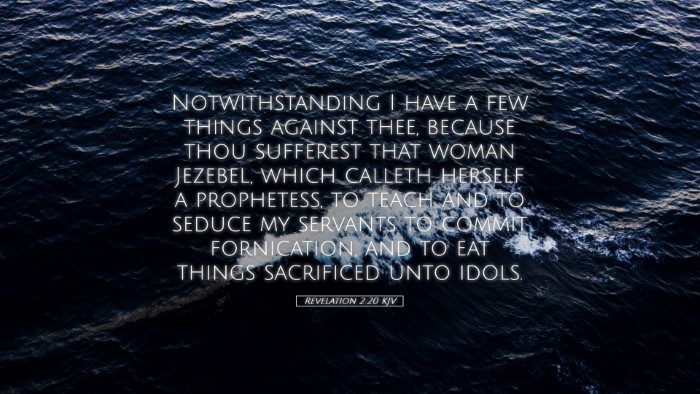Commentary on Revelation 2:20
Verse Reference: Revelation 2:20 - "But I have a few things against you, because you allow that woman Jezebel, who calls herself a prophetess, to teach and seduce My servants to commit sexual immorality and eat things sacrificed to idols."
Introduction
This verse from the book of Revelation addresses the church in Thyatira, explicitly criticizing the presence of false teachings and moral decay within the congregation. The metaphor of "Jezebel" signifies an individual or group promoting idolatry and unchastity, echoing the historical figure from the Old Testament. Understanding this passage is crucial for pastors, students, theologians, and Bible scholars alike, as it speaks to the dangers of compromised faith and the importance of doctrinal purity.
Historical Context
To fully grasp the implications of Revelation 2:20, one must consider the historical context of Thyatira. This city was known for its trade guilds, which often participated in pagan rituals, including feasting on meat offered to idols. The church faced immense pressure to conform to the secular practices of its time.
Many commentators, including Matthew Henry, emphasize the spiritual challenges that could draw believers away from holy living. These societal pressures made it easy for teachings contrary to the pure doctrine of Christ to infiltrate the church.
Characterization of Jezebel
The mention of "Jezebel" is particularly poignant. Albert Barnes notes that this name represents the corrupting influence of false prophets and seducers within the church. Jezebel, the infamous queen from the Old Testament, led Israel into idolatry and immorality, serving as a parallel for the internal threats facing the church at Thyatira.
Symbolism of Jezebel
- Idolatry: The reference to idolatry in the verse underscores the allure of cultural practices that conflict with the tenets of the Christian faith.
- Moral Compromise: As Jezebel enticed the Israelites with gentile practices, so too does this figure encourage the church to indulge in sexual immorality.
- False Prophecy: The self-attested role of Jezebel as a "prophetess" is a reminder of the importance of discerning true prophecy from deception.
Theological Implications
The theological implications of this verse are profound. Adam Clarke interprets this condemnation as a warning against the influence of heretical teachings, reminding the church that its integrity is paramount in the eyes of God.
Lessons on Church Discipline
- Vigilance in Leadership: Church leaders bear the responsibility of protecting their congregations from falsehoods.
- Accountability: Allowing false teachings results in spiritual decay, emphasizing the need for accountability among church members.
- Restoration and Repentance: The church is called to repent of its acceptance of sin and to restore purity and truth, which is vital for spiritual health.
Application for Today’s Church
The relevance of Revelation 2:20 to today's church cannot be overstated. Contemporary congregations must constantly evaluate their teachings and practices against Scripture to avoid the trap of modern-day Jezebels—those who might distort the gospel for personal gain or societal acceptance.
Contemporary Issues
- Societal Pressure: Churches today face intense pressure to conform to culturally accepted norms that may contradict biblical teachings.
- Sexual Ethics: The challenge of maintaining sexual integrity remains significant, as the church navigates a landscape where views on morality are polarized.
- Confronting False Teachings: Active discernment and clear teaching from Scripture are necessary to combat misinformation within the church.
Spiritual Warfare and Encouragement
Pastors and church leaders are reminded that they are engaged in spiritual warfare. As Matthew Henry asserts, vigilance is necessary to guard against deception that can seduce even the most dedicated believers. Yet, there is encouragement in the assurance that Christ holds the authority to judge and correct His church, beckoning them back to the path of righteousness.
Conclusion
In conclusion, Revelation 2:20 serves as both a warning and an exhortation for the church. The call to reject falsehood and embrace purity is as relevant today as it was in the early church. The character of "Jezebel" serves to remind us of the dangers that lurk within and outside the church. It is imperative for today’s church to cultivate a deep reliance on the Holy Spirit, fostering an environment of truth and accountability to lead its members in holiness and sound doctrine.


